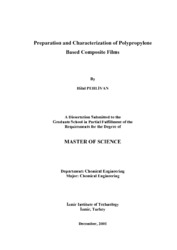Please use this identifier to cite or link to this item:
https://hdl.handle.net/11147/3740| Title: | Preparation and Characterization of Polypropylene Based Composite Films | Authors: | Pehlivan, Hilal | Advisors: | Tıhmınlıoğlu, Funda | Publisher: | Izmir Institute of Technology | Abstract: | In the scope of this study, preparation of silver . natural zeolite reinforced polypropylene (PP) composite system possessing antibacterial properties via ion exchange process and characterization by means of different techniques (FTIR, TGA, DSC, mechanical tests, optical microscopy) were aimed. It has been established that zeolites are suitable for removing Ag ions from silver containing solutions and that silver zeolites are increasingly investigated as germicidal, bactericidal, antifungal, and antiseptic components in different compositions (Hagiwara 1990, Kawahara 2000, Klasen 2000).In the present study, prior to the ion exchange studies, water sorption behavior of PP . clinoptilolite rich natural zeolite composites was investigated, since the ion exchange process was to be conducted in aqueous media. It was observed that a hydrophobic polymer, PP attained the property of water sorption due to the porous structure of the composite films. The effective diffusivity of liquid water in the PP-zeolite composites prepared by hot press and extrusion techniques varied in the range of 0.3- 9.9 x10-10 and 0.1 - 3.3 x10-12 cm2/s, respectively. Silver loading to PP - zeolite composites was provided by means of two different methods. In Method I, PP - zeolite composite films were treated with a variety of silver ion containing solutions (5 to 50 ppm AgNO3 solution), whereas in Method II silver exchanged zeolite minerals (prepared with initial AgNO3 concentrations of 50, 500, and 5000 ppm) were molded with PP in the presence of DOP (Dioctyl Phthalate). The amounts of Ag+ loaded per gram of zeolite for initial AgNO3 concentrations of 50, 500, and 5000 ppm were determined as 4.36, 27.85, and 183.78 mg, respectively. Antibacterial activity tests against E.coli indicated that the samples obtained in Method II were superior to those prepared by Method I since the penetration of silver ions to the zeolite phase was limited by the PP phase in the case of Method I. However, the discoloring effect of silver ion was readily observed for the samples prepared by Method II as indicated by the discoloration parameters. The release of Ag+ to water was found to be negligible as reported in literature leading to long . term antibacterial activity.The thermal characterization studies showed that the addition of the zeolite increased the crystallinity of the structure acting as a nucleating agent in PP crystallization as well as retarded the degradation temperature of PP. At low silver concentrations, the zeolite behaved as a decelerating agent in PP, however at higher silver concentrations, the composites degraded at a faster rate than pure PP. Yet the activation energy values for the thermal decomposition reactions of Method II was considerably lower indicating that the decomposition has been accelerated by the presence of silver.It was found that the addition of the zeolite into the PP matrix decreased the density of pure PP (0.89 g/cm3) due to the formation of voids. However, a systematic approach was not observed with the increasing zeolite content as a consequence of the uneven zeolite distribution. On the other hand, a considerable enhancement was noticed for the tensile tested film densities changing between 0.58 - 0.78 g/cm3, which are in a better agreement with the commercially desired range (0.6 - 0.65 g/cm3) for packaging applications of PP composites. Mechanical tests indicated that the addition of the zeolite tended to decrease the yield stress values while a slight decrease was observed for Young moduli. The effect of silver on the Young Modulus values of the composites is not quite significant, however the yield stress values increased from 23.6 to 29.5 MPa with the increasing silver concentration.Consequently, of all the composite films prepared by Method II, the ones loaded with 4.36 (mg Ag+/g zeolite) containing 2, and 4 % wt zeolite were selected to be the most appropriate, considering the thermal, mechanical, and structural characteristics as well as the discoloring actions. | Description: | Thesis (Master)--Izmir Institute of Technology, Chemical Engineering, Izmir, 2001 Includes bibliographical references (leaves: 133-138) Text in English; Abstract: Turkish and English xvi, 138 leaves |
URI: | http://hdl.handle.net/11147/3740 |
| Appears in Collections: | Master Degree / Yüksek Lisans Tezleri |
Files in This Item:
| File | Description | Size | Format | |
|---|---|---|---|---|
| T000018.pdf | MasterThesis | 1.89 MB | Adobe PDF |  View/Open |
CORE Recommender
Page view(s)
258
checked on Apr 28, 2025
Download(s)
138
checked on Apr 28, 2025
Google ScholarTM
Check
Items in GCRIS Repository are protected by copyright, with all rights reserved, unless otherwise indicated.